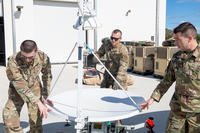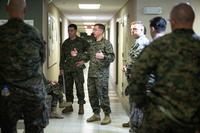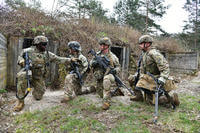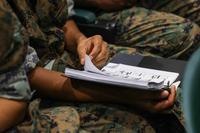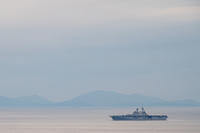 Senior Defense Department officials said Friday the long-planned deployment of the Marines’ MV-22 Ospreys to Okinawa might be postponed in the face of mounting opposition in Japan over the safety of the tilt-rotor aircraft.
Senior Defense Department officials said Friday the long-planned deployment of the Marines’ MV-22 Ospreys to Okinawa might be postponed in the face of mounting opposition in Japan over the safety of the tilt-rotor aircraft.
“There’s never been a deployment schedule” for the Ospreys, a senior Defense official said on background , despite repeated on-the-record statements to the contrary by other Defense officials and the Marine Corps.
The Marine Corps said Thursday there had been no changes in the long-planned schedule to move 12 Ospreys from the Marines’ Naval Air Station at Iwakuni, on the Japanese home island of Honshu, to Okinawa later this month. The Marines had hope to start flying out of the Futenma Air Station on Okinawa in October.
The Marines want to station a total of 24 Ospreys at Futenma to replace the Vietnam-era CH-46 helicopters they have been using.
Two senior Defense officials, who spoke at the Pentagon on grounds of anonymity, said the work of the U.S.-Japan Joint Committee meeting in Japan on the reliability of the Ospreys had bogged down on the safety of operating the aircraft over populated areas.
“The issue is safety and we need to re-confirm the issue of safety,” one of the senior defense officials said. The official sidestepped the apparent contradiction on the scheduling issue, saying only “that’s where the process is at the moment.”
A Marine spokesman confirmed that the plan had been to put the Ospreys in Futenma in September and have them flying in October “but we know that the decision is going to be made at higher levels. We’ll carry out our orders as they are given. We do hope they’ll be there [in Okinawa] in October.”
The Joint Committee has been reviewing two recent Osprey accidents – a training crash of a Marine MV-22 in Morocco in April that killed two crew members and a second crash near Eglin Air Force Base, Fla., in June that injured four aboard a CV-22, the Air Force variant of the Opsrey.
Last Sunday, protesters on Okinawa marched against the deployment of the Ospreys and also called for the shutdown of Futenma. Rally organizers estimated the crowd at 100,000, but home island Japanese officials said about 25,000 turned out.
Under the current Status of Forces agreement, the U.S. could unilaterally put the Ospreys on Okinawa. In Tokyo, the English-language Japan Times called for the U.S. and Japan to consider scrapping the Osprey deployment to preserve the close security relationship between the two countries.
In an editorial, the newspaper said the “deployment will intensify the feelings by Okinawans that they are discriminated against.
“The U.S. and Japan should rethink the Osprey deployment plan,” the newspaper’s editorial board wrote.

